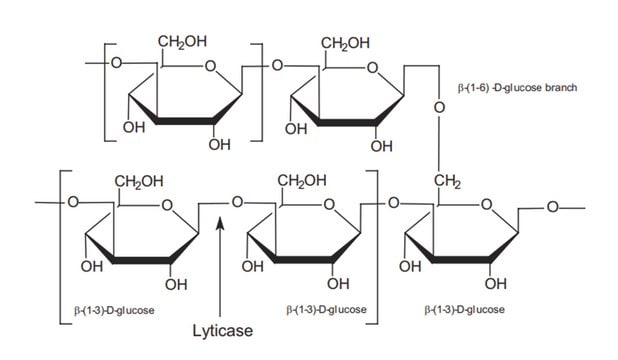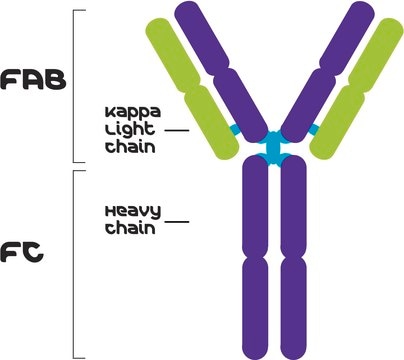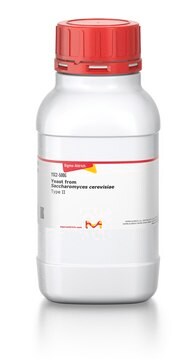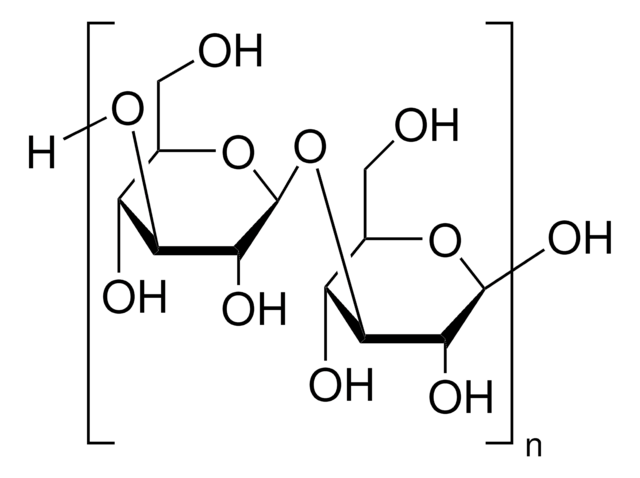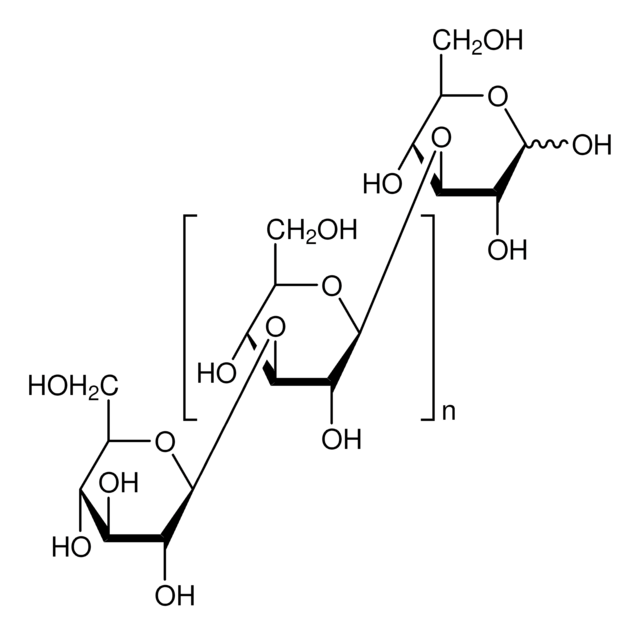M7504
Mannan from Saccharomyces cerevisiae
prepared by alkaline extraction
Synonym(s):
D-Mannan
Sign Into View Organizational & Contract Pricing
All Photos(4)
About This Item
Recommended Products
biological source
bakers yeast (whole cell)
Quality Level
form
powder
optical activity
[α]/D 73 to 89 °, c = 1% (w/v) in water
impurities
<1.0% Low molecular weight saccharides (TLC)
color
beige
solubility
water: ~50 g/L
cation traces
Na: <2%
storage temp.
2-8°C
Looking for similar products? Visit Product Comparison Guide
General description
Mannan is the main component of yeast cell wall polysaccharides broadly present in nature, such as in plants, bacteria, yeasts, and other organisms. It comprises a highly branched complex carbohydrate, an α-1,6 backbone with α-1,2- and α-1,3-attached mannose side chains.
Application
Mannan from Saccharomyces cerevisiae has been used to coat the microtiter wells to quantify the levels of mannose-binding lectin (MBL) using a mannan-binding enzyme-linked immunosorbent assay (ELISA).
Mannan from Saccharomyces cerevisiae has been used in a study to assess nonopsonic uptake of Mycobacterium avium complex by human monocytes and alveolar macrophages. It has also been used in a study to investigate new lectins from bulbs of Croccus sativum.
Biochem/physiol Actions
Mannan exhibits several biological properties, including antiproliferative, antioxidant, and immunomodulatory. It is used as a hardener ingredient and as an emulsion stabilizer. Mannan is also involved in the inhibition of pathogen adherence, regulation of bacterial growth, and enhancement of the immune response.
Preparation Note
Prepared by method of Haworth.
Other Notes
To gain a comprehensive understanding of our extensive range of Polysaccharides for your research, we encourage you to visit our Carbohydrates Category page.
Storage Class Code
11 - Combustible Solids
WGK
WGK 3
Flash Point(F)
Not applicable
Flash Point(C)
Not applicable
Personal Protective Equipment
dust mask type N95 (US), Eyeshields, Gloves
Certificates of Analysis (COA)
Search for Certificates of Analysis (COA) by entering the products Lot/Batch Number. Lot and Batch Numbers can be found on a product’s label following the words ‘Lot’ or ‘Batch’.
Already Own This Product?
Find documentation for the products that you have recently purchased in the Document Library.
Customers Also Viewed
Michael L Patnode et al.
Cell, 179(1), 59-73 (2019-09-21)
Development of microbiota-directed foods (MDFs) that selectively increase the abundance of beneficial human gut microbes, and their expressed functions, requires knowledge of both the bioactive components of MDFs and the mechanisms underlying microbe-microbe interactions. Here, gnotobiotic mice were colonized with
Y Oda et al.
Biological & pharmaceutical bulletin, 16(10), 978-981 (1993-10-01)
Four isolectins were isolated from bulbs of Croccus sativum (saffron), using affinity chromatography on mannan-Sepharose 4B, gel filtration and ion-exchange column chromatography in the presence of 8 M urea. The relative molecular masses of these lectins were determined by gel
Polysaccharides. Part XXIV. Yeast mannan.
Haworth, W.N., et al.
Journal of the Chemical Society, 784-791 (1937)
J A Roecklein et al.
The Journal of laboratory and clinical medicine, 119(6), 772-781 (1992-06-11)
The uptake of Mycobacterium avium complex (MAC) microorganisms by human peripheral blood monocytes (PBMs) and alveolar macrophages (AMs) is not well understood. We have previously shown, under opsonic conditions, that humoral factors are important in mediating the uptake of MAC
Geelsu Hwang et al.
PLoS pathogens, 13(6), e1006407-e1006407 (2017-06-16)
Candida albicans is frequently detected with heavy infection by Streptococcus mutans in plaque-biofilms from children with early-childhood caries (ECC). This cross-kingdom biofilm contains an extensive matrix of extracellular α-glucans that is produced by an exoenzyme (GtfB) secreted by S. mutans.
Our team of scientists has experience in all areas of research including Life Science, Material Science, Chemical Synthesis, Chromatography, Analytical and many others.
Contact Technical Service